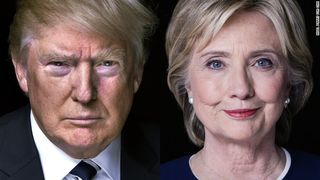Politics
Kids, Politics, and the Gender Divide
New research shows kids are politically interested, but often misinformed.
Posted September 25, 2019 Reviewed by Gary Drevitch
When it comes to talking politics with your children, you may wonder if they notice what's going on, and whether they care at all. Some of our latest research, headed by Meagan Patterson and Rebecca Bigler and published by the Society for Research in Child Development, shows that kids are very interested in politics but often misinformed. This is based on a collaborative study, in Kansas, Kentucky, Texas, and Washington, conducted with elementary-school children before and after the 2016 presidential election. What do kids know, and what do they not know? We were pleasantly surprised by how engaged children were with the election and how much they knew about the candidates and about their specific policies.
To do this research, we interviewed 187 racially diverse elementary school children before and after the 2016 U.S. presidential election to gain insight about their political knowledge, opinions, and experiences. We made sure the areas we sampled varied in their voting patterns.
What did we learn about children and their attitudes about politics?
1. Children were really interested in, and surprisingly knowledgeable about the election. Over 90 percent of children sampled could provide information about at least one of the candidates (such as a policy proposal or personal characteristic). Nearly all children (99 percent) expressed a preference for one candidate to win the election and knew the election outcome.

2. Children weren't without opinions. And not positive ones. Many children expressed negative views of the candidates. More than 55 percent of the kids made at least one reference to Trump’s negative personal characteristics, saying things like "He's a bad person and said a lot of mean things," "He says bad things about women," "He's a big fat liar," and "Donald Trump called women pigs and that is not nice at all." Clinton was not exempt from negative characterizations either, with 18 percent of children making a negative comments. One child reported that she "deleted 30,000 emails and gave away top secret government info." Sometimes children even noticed the overlaps between the two, with one child noting, "Clinton went to Trump's wedding." The difference in noting their negative characteristics might be that a majority of children in the sample were drawn from areas in which most voters supported Clinton.
3. Both family and community environments appeared to influence children’s attitudes. Not surprisingly, children whose parents supported Trump were also more likely to support Trump. But what is more surprising is that children’s knowledge of candidates also reflected the voting patterns in the county where they lived. Children who lived in counties with high levels of support for Trump were actually more knowledgeable about Clinton than children in counties with moderate levels of support for Trump. Our best guess: These are the communities where there was a lot of negative discussions about Clinton that children overheard.
4. Children were really aware of a lot of the policies the candidates talked about. Most common: immigration. More than 40 percent of children made at least one reference to Trump’s immigration policies, most of them talking about Trump's plan to build a wall at the Mexican-American border. Why was this so common? Likely because the idea of a wall is both literally and figuratively concrete. Because of the simplicity of the concept, children can understand putting a wall up to keep people out. Although not as common, children also included references to gun control, taxes, jobs, international relations, women’s rights, and crime.
5. Despite all of this, children had some pretty significant gaps in their information. These gaps were most obvious when it came to assessing their understanding of gender disparities. For example, although it was a smaller percentage than has been found in past studies, only 65 percent of children knew that the United States had never had a female president.
Only one in three children knew a woman had ever been president of any country and no children could actually name a female world leader. When asked why women had never been the president, one out of four children thought women lacked leadership ability or were unqualified.

Children also lacked knowledge about women’s underrepresentation in government. Nearly half reported that 50 percent or more of all U.S. governors and members of Congress are women, whereas the accurate percentages at that time were around 20 percent.
When children were asked to name a specific person who had worked for women's rights, only 12 children in the entire study could name one. Of those 12, 11 named Hillary Clinton. One lone, 7-year-old girl named Susan B. Anthony. As we celebrate the 100-year anniversary of women's rights to vote, I hope that number increases.
What did we ultimately learn from this study? No matter what political ideology you believe in, children should understand the rules of elections, should understand what characteristics you value, and should understand where disparities exist. Parents should talk to their children about their political beliefs and values. Teachers should talk about the political process, the structure of our government, and the importance of voting in a democracy.
Despite our divisions, no one benefits if children become cynical and disinterested in politics. Rather, we should encourage children’s interest in the political process to hopefully create lifelong political participation. Elections are great opportunities to talk to kids about your values and the importance of civic engagement. And throw in a history lesson about women's suffrage while you are at it.
The study appears in the Monographs of the Society for Research in Child Development. Accompanying commentaries, videos and teaching materials are available on the Monograph Matters website.
References
Patterson, M. M., Bigler, R. S., Pahlke, E., Brown, C. S., Hayes, A. R., Nelson, A., & Ramirez, C. (2019). Toward a developmental science of politics. Monographs of the Society for Research in Child Development.




